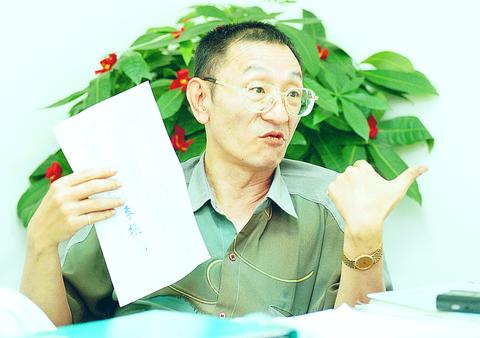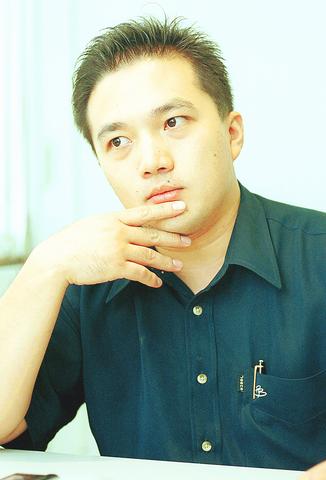Finding a way to make people in debt pay up has always posed a problem. But one man has found that thinking unconventionally often reaps the most rewards.
First he hired former jail inmates to collect debts, then people who were HIV-positive. And if everything goes to plan, the next group of collection agents will be prostitutes.
The aim of this new agency is clear: Debts must be paid.

PHOTO: CHIANG YING-YING, TAIPEI TIMES
Tung Nien-tai (
Even though the methods that the company uses to get people to pay are often criticized as being unorthodox, the company has raised its national profile and amazingly, is making big money.
"I never think of losing money. It's a large market and I'm quite confident of what I can achieve. I'm Tung Nien-tai. I'm everyone's nightmare," the 50-year-old said, flashing a smile stained with betel nut juice.

PHOTO: CHIANG YING-YING, TAIPEI TIMES
A man with a long history
Tung, who had been in and out of jail several times before 1987, has spent most of his life criticizing police and public officials who he believes often abuse their power to violate the rights of ordinary citizens. "My prison experiences tell me that," he said.
Tung formed the Resurrection Services Center in 1987 and made a name for himself by challenging what he called the "top 10 bad cops in the country." Later, to press for the legalization of casinos, he held a national mahjong (
His other "achievements" include provoking a prison riot, holding a seminar attended by the nation's leading gangsters and finally forming the Taiwan Communist Party.
He has been a street vendor, a real estate broker, a restaurant owner, and a florist. Now he dedicates his time and energy to the collection agency. Making money is a priority, but he has another concern -- to make the privileged look bad.
"We're doing everything to embarrass the debtors and smash their shield of privilege. I just can't tolerate people abusing their positions or their power to take advantage of the weak," Tung said. "And believe me, I'm able to think of thousands of ways to make these people look bad. I know what the debtors are afraid of."
A method to the madness
When a client turns to ResuCredit for help, he or she is first requested to provide a complete collection of documents and court papers in relation to the debt to be collected.
Following the verification process, Tung then starts discussing details of the case and tells his clients there is at most a 50 percent chance they will get their money back.
"I never boast to my clients that I can absolutely get their money back. I make it clear at the beginning that it's a 50-50 situation. But if I can't get back the money for them, I don't think anyone can," Tung said.
With the information at hand, Tung begins studying possible methods to collect the debt. Tung uses different methods according to the kind of person that owes money.
A debt-collection team of ex-cons, for example, is often used to collect debts from individuals. They stand in front of a debtor's house carrying banners or posters that, in effect, air the debtor's dirty laundry.
If this doesn't get the desired response, the team then begins to stalk the debtor. Most of the time this method works -- the debtor gets so embarrassed by the fierce-looking gang tailing him that he finally surrenders.
In dealing with corporate debtors, Tung deploys a team of HIV-positive patients who confront the debtor with signs that say "I'm HIV-positive."
Sometimes those infected with HIV will even hug the debtor, but that is as far as the intimidation goes.
The debt collectors are hired on a case-by-case basis and each of them is paid NT$3,000 per day. Controversial as the methods might be, they do not violate the law.
"Our latest case is to try to collect from a guy whose father is a local commissioner and whose mother is a lawmaker. This time, I'm going to use prostitutes to carry out the job," Tung said.
On dangerous ground
With business booming, Tung has become a thorn in the side of traditional collection agencies who often resort to violence, or the threat of it, to make debtors pay.
"I've just received three calls from them today, threatening horrible consequences if I still have my own way. While I'm talking to you now, I'm at the same time thinking of how to fight these battles," Tung said during his interview with the Taipei Times.
Because he runs his business in such a controversial way, Tung says that he is well aware that he will have to accept the fact that not everyone will appreciate his techniques.
One debtor, who has been tailed by Tung's debt-collection team, recently went to the police and filed a complaint of defamation against him. It is the first such action, but Tung seems to sense that it will not be the last.
"I don't care. Let's see who will be most embarrassed in the end," he said.
The cavalier way Tung does business may sound daring, but in fact his every move has been carefully thought out. His business partner, Ivan Liu (
Liu, having observed the debt-collection business in Taiwan and Western countries, encouraged Tung to start his own company after Tung began to take the idea seriously.
Substantiation
"Based on my experience as a lawyer, I can tell you over 1,000 ways for a debtor here to release his property and dodge his legal liabilities. That's why I think Taiwan badly needs a debt-collection agency like us," Liu said.
Liu said that in the "old days," the stereotype was that of poor debtors and rich creditors. He noted, however, that today it is exactly the other way around.
"Six or seven of our clients are those who have been swindled into investing their life savings in some sort of bogus operation. Unfortunately, the people running these scams often have such good connections with public officials or the police that they can easily avoid prosecution," Liu said.
"I know there are people who don't agree with our methods. But let's be fair and get it straight: Who is the source of all this agony? We wouldn't have to take the pains to plan these things in such detail if the debtors would just repay the money they owe," he said.
Though being supportive of Tung's peculiar ideas, Liu still has to make sure the actions of the company do not result in legal prosecution. Before the debt-collection teams go out on their missions, Liu gives them briefings on the possible consequences of their actions.
"And each of them will be asked to sign an agreement stating that they are responsible for their own actions and that the company does not assume responsibility for them," Liu said.
"We don't allow the actions of any individual to hurt the company. It's our bottom line not to do anything that would affect the company's survival," he said.
PROMISING BUSINESS
In recent years, the debt-collection market in Taiwan has grown significantly.
Currently there are more than 2,000 debt-collection agencies in the country and 90 percent of them are based in Taipei.
Because of the thriving business niche, there are increasing numbers of lawyers, retired police officers and security men entering the market.
"In the years to come, our company will have its shares being bought and sold on the stock market," Liu said. "And we also have our eyes on the profitable business of having the government as a client. The government is now planning to have private agencies collect taxes and fines for it."
Having been made known to the public via media reports, ResuCredit now has not only individual clients but more and more corporate clients, including a well-known bank.
ResuCredit has one outstanding debt of over NT$70 million to collect.
Tung, who is just as optimistic as Liu about the company's future, agreed that the government will be one of his company's most important clients in the near future. However, despite the possibility of working government contracts, Tung says he will not compromise his distain for the government by collecting for it.
"Sure, we'll do the work. But I'm not going to court them for business. I think in the meantime they'll beg us to take their cases because our company is more effective than any one else," Tung said.

Authorities have detained three former Taiwan Semiconductor Manufacturing Co (TMSC, 台積電) employees on suspicion of compromising classified technology used in making 2-nanometer chips, the Taiwan High Prosecutors’ Office said yesterday. Prosecutors are holding a former TSMC engineer surnamed Chen (陳) and two recently sacked TSMC engineers, including one person surnamed Wu (吳) in detention with restricted communication, following an investigation launched on July 25, a statement said. The announcement came a day after Nikkei Asia reported on the technology theft in an exclusive story, saying TSMC had fired two workers for contravening data rules on advanced chipmaking technology. Two-nanometer wafers are the most

NEW GEAR: On top of the new Tien Kung IV air defense missiles, the military is expected to place orders for a new combat vehicle next year for delivery in 2028 Mass production of Tien Kung IV (Sky Bow IV) missiles is expected to start next year, with plans to order 122 pods, the Ministry of National Defense’s (MND) latest list of regulated military material showed. The document said that the armed forces would obtain 46 pods of the air defense missiles next year and 76 pods the year after that. The Tien Kung IV is designed to intercept cruise missiles and ballistic missiles to an altitude of 70km, compared with the 60km maximum altitude achieved by the Missile Segment Enhancement variant of PAC-3 systems. A defense source said yesterday that the number of

A bipartisan group of US representatives have introduced a draft US-Taiwan Defense Innovation Partnership bill, aimed at accelerating defense technology collaboration between Taiwan and the US in response to ongoing aggression by the Chinese Communist Party (CCP). The bill was introduced by US representatives Zach Nunn and Jill Tokuda, with US House Select Committee on the Chinese Communist Party Chairman John Moolenaar and US Representative Ashley Hinson joining as original cosponsors, a news release issued by Tokuda’s office on Thursday said. The draft bill “directs the US Department of Defense to work directly with Taiwan’s Ministry of National Defense through their respective

Tsunami waves were possible in three areas of Kamchatka in Russia’s Far East, the Russian Ministry for Emergency Services said yesterday after a magnitude 7.0 earthquake hit the nearby Kuril Islands. “The expected wave heights are low, but you must still move away from the shore,” the ministry said on the Telegram messaging app, after the latest seismic activity in the area. However, the Pacific Tsunami Warning System in Hawaii said there was no tsunami warning after the quake. The Russian tsunami alert was later canceled. Overnight, the Krasheninnikov volcano in Kamchatka erupted for the first time in 600 years, Russia’s RIA